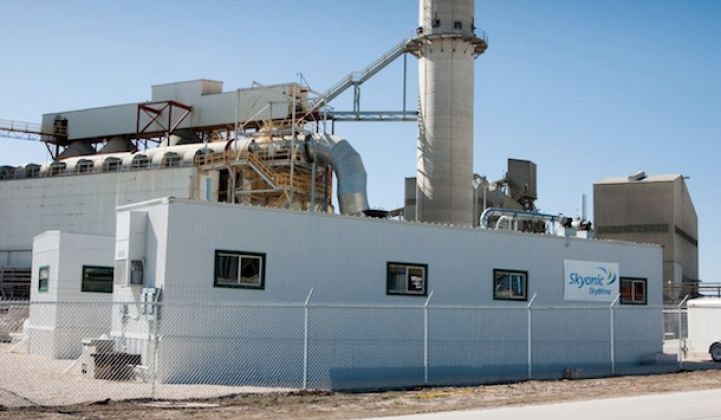The carbon capture industry has been dogged by high costs, plant delays and a contentious debate about its role in the energy mix. At the same time, the broader cleantech sector has suffered from a drop in venture funding after a number of high-profile flops.
So it's a quite a development when one of the biggest venture funding rounds of the year goes toward a carbon capture technology.
Skyonic, a Texas-based firm that captures carbon dioxide from power plants and turns it into baking soda and chemicals, has just closed a $128 million Series C round of funding.
The round brought in Cenovus Energy, Bluecap Partners, Toyo-Thai Corporation and Energy Technology Ventures as new equity investors. These firms were added to the list of previous big-name funders, which included Berg & Berg Enterprises, Northwater Capital Management, ConocoPhillips, BP Ventures, PVS Chemicals and Zachry Corporation.
Combined with a $28 million grant from the Department of Energy, this surge of capital will be used to build Skyonic's first commercial-scale project at a coal plant in Texas, which the company hopes to complete by next year. Skyonic is currently operating a demonstration plant at a cement production facility in Austin, Texas.
Unlike many other carbon-capture technologies, Skyonic avoids storing carbon directly underground. The costs, regulatory uncertainties and unknown environmental impacts of injecting CO2 into geologic formations is one of the biggest factors delaying projects. Skyonic instead traps the CO2 and heavy metals from flue gasses above ground and mineralizes them into chemicals and baking soda.
The company claims its carbon capture method is "substantially lower cost than other carbon-capture technologies," but does not specify exactly how much. Skyonic also claims it can start making a profit at its commercial-scale facility in three years by selling usable products made from the captured CO2.
When fully running, the commercial plant will trap 83,000 tons of CO2 each year. The entire coal sector accounted for 1.6 billion metric tons of CO2 in 2012, according to the Energy Information Administration.
The Skyonic announcement came just as President Obama announced his new climate strategy in a speech yesterday. The plan included $8 billion in self-fund loan guarantees for advanced fossil energy technologies, including carbon capture and storage.
"Now, one thing I want to make sure everybody understands: this does not mean that we’re going to suddenly stop producing fossil fuels," said President Obama of his strategy.
A company like Skyonic (and its range of investors from the fossil fuel industry) are betting that carbon capture will be a far more valuable part of the mix under Obama's plan. If the company can scale its commercial operations in the short timeframe it says it will, the technology could be ready just when EPA regulation of CO2 from power plants kicks in.
Although this technology appears to be in the lead, the government is not giving up on the promise of geologic sequestration. Just today, the Department of Interior released an assessment of America's technically feasible underground storage capacity for CO2. The study, lead by the U.S Geological Survey, found that the country has 3,000 gigatons of storage potential. It did not assess the economics of tapping that storage or the potential regulatory hurdles.
"In any such discussion around climate change, geologic carbon sequestration could play a prominent role," said Interior Secretary Sally Jewell on a phone call with reporters, talking about the role of carbon capture in the White House climate strategy.



